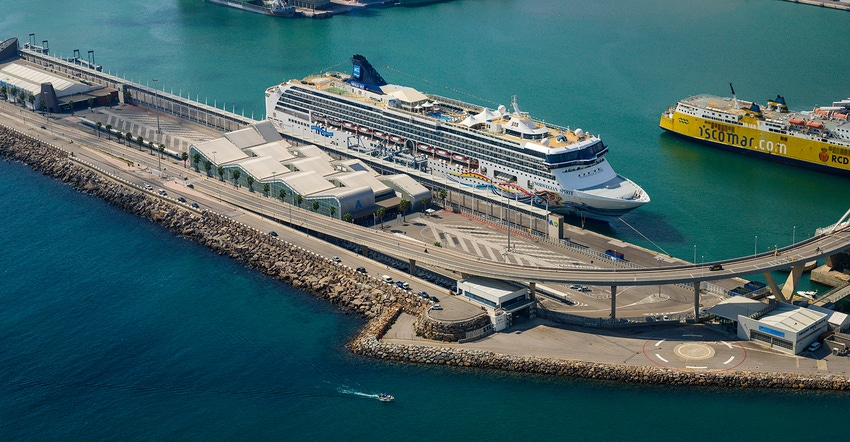Marine Ports: Standardizing Charging for Sustainable Electrification
Standardized charging protocols for marine ports, exemplified by the success in Marseille, address emissions challenges while facing ongoing battles like in Red Hook.

Marine ports serve as vital points of global commerce, facilitating the movement of goods and passengers across the world's waterways. However, their operations often come at a cost to the environment, as the concentration of diesel-powered vessels at ports leads to significant air pollution. To mitigate these environmental impacts and promote sustainability, the electrification of marine ports through shore power infrastructure has emerged as a promising solution. Central to the successful implementation of shore power infrastructure is the development and adoption of charging standards tailored to the unique needs of the maritime industry.
The need for charging standards
The electrification of marine ports presents numerous benefits, including reduced emissions, improved air quality, and decreased reliance on fossil fuels. However, the widespread adoption of shore power infrastructure requires standardized charging protocols to ensure interoperability, efficiency, and safety. Charging standards serve as a blueprint for the design, installation, and operation of shore power systems, providing guidelines for connector types, power levels, communication protocols, and safety measures.
Institutions working on proposed charging standards
Several institutions and organizations are actively engaged in developing proposed standards for electrifying marine ports. These include:
International Electrotechnical Commission (IEC): The IEC is a leading international standards organization responsible for developing universal EV connector standards. It aims to harmonize marine charging standards globally, ensuring compatibility and interoperability across ports and vessels.
International Organization for Standardization (ISO): ISO publishes standards related to electric ships and onboard charging, contributing to the development of universal marine charging standards.
Society of Automotive Engineers (SAE): Through its committees, SAE is leveraging its expertise in electric vehicle standards to develop charging standards tailored to electrify the maritime industry.
Successful example: Port of Marseille by ABB
The Port of Marseille in France is a beacon of success in implementing shore power infrastructure. In collaboration with technology leader ABB, the port has deployed shore connection technology for Corsica Linea ferries, allowing them to cut emissions and noise pollution while berthed. By utilizing ABB's power compensation solution, Dynacomp, these ferries can connect to the local grid and use electricity instead of diesel-fueled auxiliary engines, significantly reducing their environmental impact during port stays. ABB’s solution allows electricity available from the local grid in Marseille to be stepped down to 11KV to take care of ship power needs while in port.
“ABB shore connection technology enables the type of emissions-free ship power that regulators, ports, and local residents increasingly demand. With ABB’s proven technology, Paglia Orba, Jean Nicoli, and Pascal Paoli will be emissions-free when berthed in Marseille,” stated Ludovic Amouroux, Project Manager, Corsica Linea. “We estimate we will use between 7MWh and 11 MWh of zero-emission power per call, depending on the vessel.”
Ongoing battle: Red Hook, Brooklyn
However, challenges persist in adopting shore power infrastructure, as exemplified by the ongoing battle in Red Hook, Brooklyn. Residents and local authorities are grappling with pollution and environmental concerns from cruise ship activities. The proposed bill aims to restrict cruise ship pollution by requiring vessels to connect to the city's power grid while docking.
“Today, the Council is passing critical legislation to protect and support residents who live in communities surrounding our city’s terminals,” stated Speaker Adrienne Adams. “By requiring cruise ships to connect to shore power, this law will limit harmful emissions and mitigate pollution, noise, and other impacts on local neighborhoods.”
“By requiring cruise ships to connect to shore power, this law will limit harmful emissions and mitigate pollution, noise, and other impacts on local neighborhoods.”—Speaker Adrienne Adams
Although Red Hook's terminal is the only East Coast facility offering shore power connections, not all vessels can utilize this feature due to the absence of a standardized power connection. Nonetheless, deploying a "mobile jib" by the end of 2024 is anticipated to facilitate ship connections to the city's power grid to some degree.
Future of shore power
The future of shore power lies in integrating renewable energy sources and energy storage into the charging process. By harnessing solar, wind, or hydroelectric power, ports can further reduce their carbon footprint and dependency on fossil fuels. Energy storage technologies can also enhance the reliability and flexibility of shore power systems, ensuring uninterrupted power supply during peak demand periods or when renewable energy sources are unavailable.
Charging standards for electrifying marine ports play a crucial role in promoting sustainable shore power infrastructure. The successful example of the Port of Marseille underscores the benefits of standardized charging protocols, while the ongoing battle in Red Hook, Brooklyn, also highlights the need for comprehensive strategies to address environmental concerns. By integrating renewable energy sources, energy storage technologies, and standardized charging protocols, the future of shore power holds promise for a cleaner, greener maritime industry.
About the Author(s)
You May Also Like





